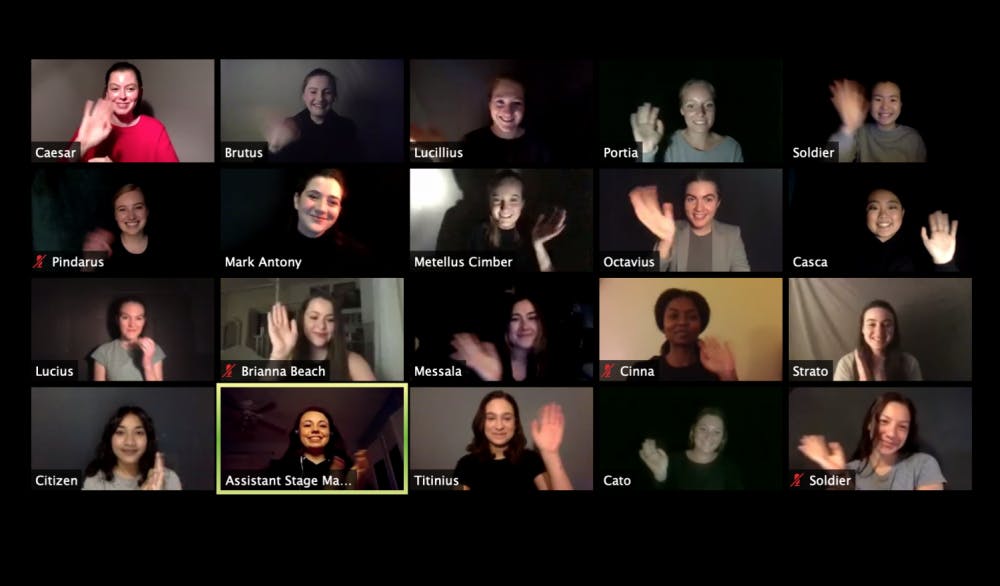Shakespeare’s “Julius Caesar,” this year’s spring faculty production, was supposed to make its debut in Wright Theatre last Thursday, April 30. When the college canceled in person classes and evacuated students, one question lingered: how would spring productions continue? The team rose to the occasion, adapting the performance to an online format. The innovative production of “Julius Caesar,” directed by Professor of Theatre Cheryl Faraone, took place on Zoom this Monday evening, complete with sound effects and screen names indicating the characters each student actor was playing.
Garnering a total of 310 viewers — almost as many as Wright Memorial Theater seats at maximum capacity — the production appealed to a wide audience. Some cast members were excited that the transition to an online format allowed family members all around the country to watch their performance. I joined the webinar around 7:28 p.m., and promptly at 7:30, the show began. Our screens opened with nine faces on a Roman feast, with Mark Antony (Becca Berlind ’21) about to begin a ceremonial run. The audience was immediately thrown into the beginning of the play. Without the rise of a curtain or the brightening of lights, we abruptly found ourselves watching a scene in Ancient Rome, all while staying in our own living rooms.
Once adjusted to the setting, the dialogue flowed smoothly — so smoothly, in fact, that it felt like we were watching a recording of the cast all together in the same room. The color scheme was subdued; most cast members sported a black or white outfit against a neutral, mostly dark backdrop. The cast was entirely female, a gender bending of the usually male-majority ensemble. Subtle makeup and tied-back hair were important to the gender swap, but also contributed greatly to the minimalist aesthetics of the production.
What was immediately clear when watching the production on Zoom was the heightened importance of facial expressions of the actors. Instead of striking sets and costumes, the audience was met with brightly lit faces against neutral backdrops. Thus, each line had to be delivered with precision, or else meaning could be lost. The webinar format also presented challenges; many scenes involved the presence of several actors “on stage” (on the screen) while only one person was delivering a monologue. Because each actor was the same size on the screen, it was pertinent that any time she was onstage an actor remained completely focused and in character.
Wynn McClenahan ’22, who played the role of Julius Caesar, said learning active listening and appropriate facial reactions was key.
Of course, the climax of “Julius Caesar” involves the violent demise of the title character, stabbed to death by his fellow statesmen. Right off the bat, I was curious as to how the production would go about portraying this critical scene. In this production, Brutus (Madison Middleton ’22.5) and Cassius (Emily Ma ’21) both turned and made quick, jabbing motions away from the camera. The audience immediately saw Caesar react to being stabbed.

At the conclusion of the performance, members of the cast of “Julius Caesar” wave goodbye.
A scene intended to be so brutal lost all of its physicality. Instead, the actors' faces conveyed the intensity of the scene, coupled with a good deal of imagination on the part of the audience. Unfortunately, the online format made it so the transition between scenes wasn’t always entirely clear. Mostly, the appearances — and subsequent disappearances — of actors’ faces communicated these changes, in lieu of changes in scenery.
McClenahan said that while virtual backgrounds of the original set were considered, using them would have made things too complicated, as Zoom virtual backgrounds are not compatible with a lot of computers.
McClenahan said that when the college announced that it was closing, everyone in the production still wanted to do the show. At that point, they hadn’t started working on staging yet, and were still working through the script. Moving the production online was still a viable option, however, as there was enough time to figure out logistics and rehearse in the new format.
While the production was ultimately a success, McClenahan said there was a steep learning curve with Zoom. One key challenge was that the organization of screens on Zoom was different for each actor. The actors had to learn how to hide their own screens on Zoom, as acting while seeing their faces is not ideal. The decision to use a neutral background for the production, McClenahan said, was very much a deliberate decision, a “make it work moment” when the cast had to be flexible and adapt to their new medium.
Technical logistics aside, the camaraderie among the cast and crew during tech week is what McClenahan said she missed the most. In-person tech week is not only when all the pieces of the show come together, but when the cast and crew bond. During virtual tech week, the cast got on Zoom every night at 7 p.m. to rehearse.
Because the cast and crew could only communicate through online means, stage manager Brianna Beach ’23 and Devon Hunt ’23 gave the actors their cues through GroupMe.
“It was extra hard to go from an experience when you’re with a bunch of people to now you’re just in your house alone trying to tell your family to be quiet,” McClenahan said. “And it was kind of hard when you’re offstage, to not just completely go offstage and watch TV or something.”
For McClenahan, however, the nightly rehearsals helped create a daily rhythm, a grounding force during such an unsettling and hectic time. “You had to consciously think, I’m going to sit here and be in this moment,” she said.




